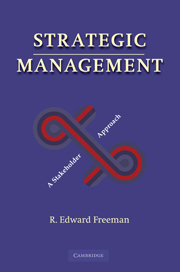Book contents
Eight - The Functional Disciplines of Management
Published online by Cambridge University Press: 05 February 2015
Summary
INTRODUCTION
The purpose of this chapter is to discuss the implications of the stakeholder approach to Strategic management for the traditional functional disciplines of management. Much has happened in the way that managers think about their disciplines and organizational structure, in general. “Organization structure” calls to mind the organization chart and associated Job descriptions, at least to most of us. We think of structure in “structured” terms.
Mintzberg (1979a), Galbraith (1973) and others have enriched our concept of organization structure in forcing us to look beneath the naive intuitions that we have. Galbraith focuses on the role of “information processing” and the strategies necessary to increase the ability of the organization to process information (or to decrease the need to process information), by concentrating on “task uncertainty.” Such uncertainty does not appear in the organization chart, nor the job descriptions of most corporations. Mintzberg's encyclopedic review of the literature defines “structure” quite simply as, “the sum total of the ways in which it [the organization] divides its labor into distinct tasks and then achieves coordination among them.” Structure must somehow reflect the tasks that organization members perform and the ways that such tasks fit together into the Output of the organization. Such a concept of structure need not show up on an organization chart nor be ensconced in job descriptions.
- Type
- Chapter
- Information
- Strategic ManagementA Stakeholder Approach, pp. 214 - 237Publisher: Cambridge University PressPrint publication year: 2010



